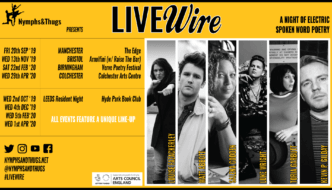
Tech is freaky. Tech is white boys in a room wearing nothing but Gap hoodies. Tech is necromancy. Tech is robots, but sexy. Tech is seeing colour for the first time. Tech is an energy forest the size of – Oregon! or, a red blood cell. Tech is Cupertino – Apple’s headquarters but co-opted by Philip K. Dick; from the sky it is a blazing blue ring, an eye, a portal, a plug-hole.
Newly baptised as a CIC, Cognitive Sensations has just launched its expanded public programme with ‘The Downloadable Brain’, a multi-media exploration of the impact of technology on society, which aims to build research at the busy intersection between art, science and digital culture.
Featured in the programme are the works of twelve artists, writers and researchers responding to the looming reality of machine and human integration, variously interpreting this evolution as both threat and salvation or, in some cases, as neither.
Over the next three months, Cognitive Sensations will be releasing artworks and hosting symposiums that investigate the impact of this digital future, covering topics from transhumanism to cybersmut.
Underpinning ‘The Downloadable Brain’ is a preoccupation with how this digital future impacts the very thing we believe makes us human: our minds. A quick internet search, and our anxieties become blatant: Does my computer know what I’m thinking? Is tech rewiring my brain? Is Google bad for me? As AI becomes more sophisticated, it’s easy to get fixated on uncannily human robots whose single purpose is world domination. But thankfully, as the founder of Cognitive Sensations Gabriella Warren-Smith states, robots aren’t autonomous – yet. What is more likely, she says, are mind-reading computers which can determine how you’re feeling based on the subtle muscular changes in your face, like knitted brows or wrinkled eyes. Perhaps sooner rather than later, small chips will live in your skin enabling you to think your tweets and send them instantly, cutting out all that re-drafting hassle. Though on reflection, mind-reading computers and robots with a murderous consciousness fall into the same genre of terrifying.
While ThoughtTweets remain a thing of the (near) future, sci-fi tropes such as Facial Recognition technology are already in regular use, indeed normalised for state and corporate ends. iPhone’s FaceID comes to mind. However, these accomplishments in software design run parallel with more sinister threats. Research continues to show that Facial Recognition technology can adopt racial biases and perpetuate systemic injustices. As an article by Kade Crockford for ACLU reveals, surveillance technology is better at identifying middle aged white men, than people of colour. While AI offers us a vision of a streamlined future, it remains clear that it’s still people – with their baggage and biases – sitting behind the computer.
These and other moral mires such as eugenics and immortality are explored by the makers of ‘The Downloadable Brain’, through a timely blend of analogue and digital mediums. Inaugurating the programme is Sarah Selby’s Artificial Evolution: a digital organism that feeds on data, data that you, by participating in the artwork, freely give – blurring the boundaries of physical and digital. Where Selby’s artwork challenges us to consider what data is, and the kind of life-force it can become, Stephen Oram asks these questions of humanity; his short story ‘William Dreams’ centres on the potential of human and machine augmentation, and the idea that anything can be monetised – even our dreams.
Rarely is an industry so inextricable from fiction. Did you know we have cellphones because of Star Trek? Rarer still is an industry which collapses the ancient divide between science and art, transforming it into a flat, open free-way, a cyborg democracy, silicon valley, a subReddit.
What is that thrill we get when we log on? It feels as though we’re peering into a future of transmuted celluloid, high-definition, and blazing neon. It is a world in which we will be able to replace lost limbs, or cure Alzheimers. But this future is also frightening. A million minds, uploaded to the cloud, endlessly duplicating and living forever. What Cognitive Sensations offers is an intelligent, critical and exciting examination of the future that has already begun. Enter the portal, slip down the drain. Shut your eyes and dream of electric sheep.
Cognitive Sensations events and artworks are free to attend and free to view: https://www.cognitivesensations.com/events
Filed under: Film, TV & Tech
Tagged with: art, artist, brain, cognitive sensations, Culture, digital, download, downloadable, event, programme, Science, synesthesia, tech, technology, transhumanism



Comments